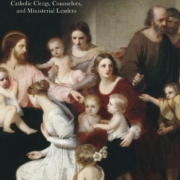The Gift of the Moral Law
In the second major part of TOB, Pope St. John Paul II guides us in exploring the implications of our redemption in Christ and the moral teaching of the New Testament for the relationship between the sexes and our call to spousal love. Before we can delve into this teaching, it is helpful to pause and ponder an essential but overlooked question: What is the purpose of the moral law?
In our modern age, law is typically seen in a distorted way as purely an instrument of control. In the best case scenario, some may see it as imposed for the sake of social order, but in the worst case, it is seen as merely a tool by those in power to maintain their position. In addition, we live in an increasingly relativistic age that rejects belief in moral absolutes, making each person the sole arbiter of right and wrong. Indeed, we regularly hear references to “your truth” and “my truth” as if truth could be different from one person to the next.
These views of the moral law pervade our culture and even infect the hearts and minds of many Catholics. If we make an honest examination, we may discover that we are embarrassed by Catholic moral teaching. We may outwardly profess to be good Catholics and faithful followers of Jesus, but when difficult moral issues come up, we distance ourselves from the teachings of the Church and hope that the topic of discussion will just go away. A complacent attitude of “well, the official teaching of the Church is _____, but only extremist / fanatical / rigid / ultra-traditional people live that way” creeps into our hearts and grows like a cancer, slowly cutting us off from the life of God within us.
When we look at the moral law in this distorted way, we can only see it as an arbitrary burden imposed on us for nefarious purposes (e.g., to control us, to make us miserable, etc.). Even more, our distorted, relativistic thinking often conceals and enables attachment to sin. These two forces work together to lead us to despise the moral law because it calls us to reform our lives. As Pope St. John Paul II said in his great encyclical on the moral life, Veritatis splendor, “Those who live ‘by the flesh’ experience God’s law as a burden, and indeed as a denial or at least a restriction of their own freedom” (no. 18). As a result, we begin to see the moral law as a threat to our freedom from which we must protect ourselves. We regard it with a sense of suspicion, resentment, and even outright hostility.
All our hearts are in need of purification from attachment to sin and the distorted, relativistic thinking of our culture. To this end, I invite us all to meditate on Psalm 119 in which the inspired psalmist beautifully pours out his deep love, thankfulness, and even yearning for God’s law. He speaks of it as sweeter than honey, finer than gold, greater than riches, the source of his comfort, the song of his house, and the delight of his heart. If we see it rightly, with pure eyes, this would be the natural response of our hearts toward all of Catholic moral teaching.
In reality, the moral law is not an imposition or a burden. Nor is it a restriction of our freedom. Rather, the moral law is one of our loving Father’s greatest gifts to us. It is meant to ensure and enhance our freedom by protecting us from ways of living that harm us. Sin is the true threat to our freedom for “everyone who commits sin is a slave to sin” (Jn 8:34). As St. Paul reminds us, “For freedom Christ has set us free; stand fast therefore, and do not submit again to a yoke of slavery” (Gal 5:1).
Our Father loves us so much that, through Christ and His Church, He has given us the fullness of the moral law so, as we pray in the Serenity Prayer, we “may be reasonably happy in this life and supremely happy with Him forever in the next.” As we meditate on Jesus’ moral teachings in future articles, let us ever remember His tender words about the true purpose of the moral law:
“If you keep my commandments, you will abide in my love, just as I have kept my Father’s commandments and abide in His love. These things I have spoken to you, that my joy may be in you, and that your joy may be full” (Jn 15:10-11).
Continue Reading: The Law of the Heart

Written by, Dr. Andrew Sodergren, M.T.S., Psy.D.,
Director of Ruah Woods Psychological Services
(Article originally published in The Catholic Telegraph, October 2023 Issue, the official magazine of the Archdiocese of Cincinnati)











